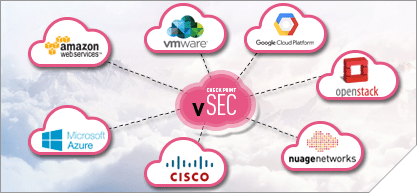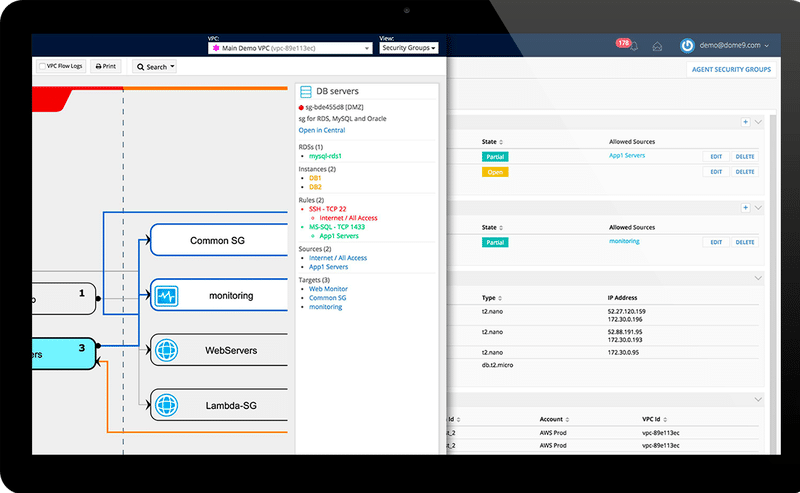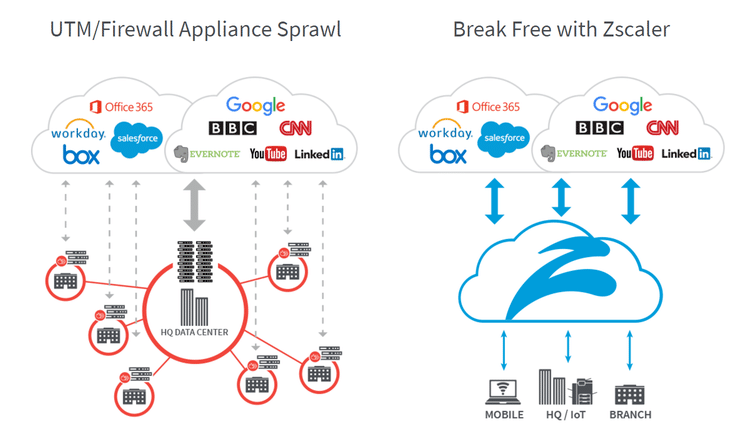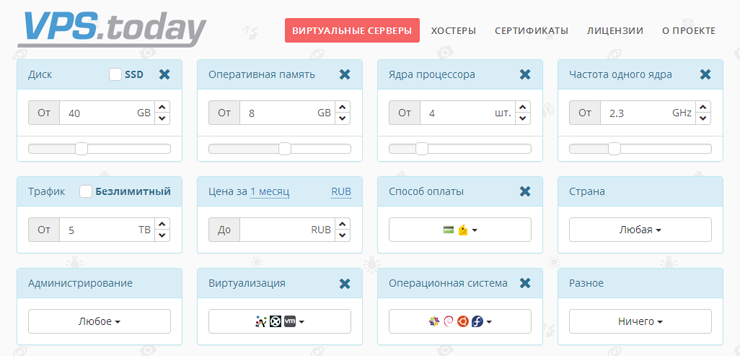7 effective managed firewalls to protect your cloud infrastructure
- Transfer
Organizations from many industries have begun to move their IT infrastructure to the clouds more actively than ever before . When we talk about infrastructure, it’s not just a server, a database, storage — it’s a lot more.
A typical medium or large organization typically has the following infrastructure components:

In a traditional infrastructure, a firewall can cost on the order of several thousand dollars and requires an administrator to manage. It is expensive .
Thank you to the managed firewall - you do not need to buy expensive equipment and hire an administrator for it.
Managed firewall is a service that you pay for using it on an as-needed or monthly basis. You can not worry about the equipment. You can administer firewall rules from an intuitive GUI or command line.
Note : In the future we are talking about the infrastructure firewall, do not confuse it with the web application firewall .
Let's look at some managed firewalls you can use to protect your working infrastructure environment.
HeatShield works with any cloud, dedicated or hybrid infrastructure of Linux servers. It supports out of the box protection against brute-force attacks on SSH and allows you to quickly view and update the firewall on all of your servers.
You can run it for free by blocking all traffic with the exception of SSH, HTTP and HTTPS on an unlimited number of servers. In accordance with the paid rate, you fully control the rules of the firewall and can use an unlimited set of rules.

If you have servers with several cloud providers, for example, GCP, AWS, Linode , Rackspace, Azure, DigitalOcean, etc., and you want to manage the firewall centrally, then HeatShield is the right choice.
Currently it supports the following Linux distributions:
Google Cloud creates default firewall rules for each Virtual Private Cloud (VPC) network. You can allow or deny connections for incoming or outgoing traffic rules and they will be applied immediately.
It maintains a priority order between 0 and 65535, where the rule with the lowest number will receive the highest priority. Everything is controlled either through the " Firewall Rules " section of the VPC network, or via the command line.
I use GCP and I love simplicity .

Several parameters are supported as a source, such as IP range, subnet, source tag, or service accounts, and you can specify multiple port numbers on one line.
If you are already using Google Cloud, then experiment with the rules to explore the possibilities of strengthening and protecting the server at the network firewall level.
A well-known security name, Checkpoint, for securing public and private clouds, offers vSEC, available for public clouds such as AWS, GCP, Azure & VMware , and private clouds such as OpenStack, VMware NSX and Cisco ACI.

vSEC provides advanced protection against threats , including firewall, IPS (intrusion prevention system), antivirus, anti-bot, zero-day vulnerability protection, DLP (data loss prevention), and application management.
You can order a free test drive .
The cloud firewall from DigitalOcean is free and you do not need to install additional software on your server. You can control which services are allowed on your droplet and from which sources. DigitalOcean

firewall is easy to use and you can manage rules in one view for the entire infrastructure.
Barracuda NexGen Firewall is available for public cloud - AWS, GCP & Azure. NexGen is a full-featured firewall solution that protects the network layer.

It acts as a network gateway between your network and the Internet and scans all incoming and outgoing traffic to ensure protection based on security policies.
The NexGen firewall has a built-in SD-WAN (software-defined WAN) to provide connectivity between the cloud and the local data center .
Dome9 Network Security is available for all three major cloud providers: Amazon Web Services, Google Cloud Platform, and Microsoft Azure.
Not just a firewall, Dome9 has powerful cloud asset visualization , built-in troubleshooting and multi-level management .

Dome9 has a free trial version .
Zscaler cloud firewall uses proprietary technologies such as SSMA, ByteScan, PageRisk, Nanolog, PolicyNow, to provide enhanced security.
You can create a detailed level of security policies for managing protocols, ports, location, user department, etc.

If you are looking for an all-in-one solution for network security with the following functions, try Zscaler:
I hope you got some ideas about cloud-based firewalls available in the market to protect small and not-so-business .
If you have a simple application, blog or website, and you can not spend too much, then as an alternative, you can try CloudWays , which offers a firewall at the platform level .
A typical medium or large organization typically has the following infrastructure components:
- server;
- load balancer ;
- database;
- messaging system;
- storage;
- safety features / DDoS protection ;
- and firewall.

In a traditional infrastructure, a firewall can cost on the order of several thousand dollars and requires an administrator to manage. It is expensive .
Thank you to the managed firewall - you do not need to buy expensive equipment and hire an administrator for it.
Managed firewall is a service that you pay for using it on an as-needed or monthly basis. You can not worry about the equipment. You can administer firewall rules from an intuitive GUI or command line.
Note : In the future we are talking about the infrastructure firewall, do not confuse it with the web application firewall .
Let's look at some managed firewalls you can use to protect your working infrastructure environment.
1. HeatShield
HeatShield works with any cloud, dedicated or hybrid infrastructure of Linux servers. It supports out of the box protection against brute-force attacks on SSH and allows you to quickly view and update the firewall on all of your servers.
You can run it for free by blocking all traffic with the exception of SSH, HTTP and HTTPS on an unlimited number of servers. In accordance with the paid rate, you fully control the rules of the firewall and can use an unlimited set of rules.

If you have servers with several cloud providers, for example, GCP, AWS, Linode , Rackspace, Azure, DigitalOcean, etc., and you want to manage the firewall centrally, then HeatShield is the right choice.
Currently it supports the following Linux distributions:
- Ubuntu;
- Debian;
- RHEL;
- CentOS;
- Fedora.
2. Google Cloud Platform (GCP)
Google Cloud creates default firewall rules for each Virtual Private Cloud (VPC) network. You can allow or deny connections for incoming or outgoing traffic rules and they will be applied immediately.
It maintains a priority order between 0 and 65535, where the rule with the lowest number will receive the highest priority. Everything is controlled either through the " Firewall Rules " section of the VPC network, or via the command line.
I use GCP and I love simplicity .

Several parameters are supported as a source, such as IP range, subnet, source tag, or service accounts, and you can specify multiple port numbers on one line.
If you are already using Google Cloud, then experiment with the rules to explore the possibilities of strengthening and protecting the server at the network firewall level.
3. Check Point
A well-known security name, Checkpoint, for securing public and private clouds, offers vSEC, available for public clouds such as AWS, GCP, Azure & VMware , and private clouds such as OpenStack, VMware NSX and Cisco ACI.

vSEC provides advanced protection against threats , including firewall, IPS (intrusion prevention system), antivirus, anti-bot, zero-day vulnerability protection, DLP (data loss prevention), and application management.
You can order a free test drive .
4. DigitalOcean
The cloud firewall from DigitalOcean is free and you do not need to install additional software on your server. You can control which services are allowed on your droplet and from which sources. DigitalOcean

firewall is easy to use and you can manage rules in one view for the entire infrastructure.
5. Barracuda
Barracuda NexGen Firewall is available for public cloud - AWS, GCP & Azure. NexGen is a full-featured firewall solution that protects the network layer.

It acts as a network gateway between your network and the Internet and scans all incoming and outgoing traffic to ensure protection based on security policies.
The NexGen firewall has a built-in SD-WAN (software-defined WAN) to provide connectivity between the cloud and the local data center .
6. Dome9
Dome9 Network Security is available for all three major cloud providers: Amazon Web Services, Google Cloud Platform, and Microsoft Azure.
Not just a firewall, Dome9 has powerful cloud asset visualization , built-in troubleshooting and multi-level management .

Dome9 has a free trial version .
7. Zscaler
Zscaler cloud firewall uses proprietary technologies such as SSMA, ByteScan, PageRisk, Nanolog, PolicyNow, to provide enhanced security.
You can create a detailed level of security policies for managing protocols, ports, location, user department, etc.

If you are looking for an all-in-one solution for network security with the following functions, try Zscaler:
- cloud firewall;
- DNS / URL filtering;
- bandwidth management;
- DNS security ;
- antivirus;
- control over file types;
- information loss prevention system.
I hope you got some ideas about cloud-based firewalls available in the market to protect small and not-so-business .
If you have a simple application, blog or website, and you can not spend too much, then as an alternative, you can try CloudWays , which offers a firewall at the platform level .
Go to VPS.today - a site for searching virtual servers. 1500 tariffs from 130 hosters, convenient interface and a large number of criteria for finding the best virtual server.


